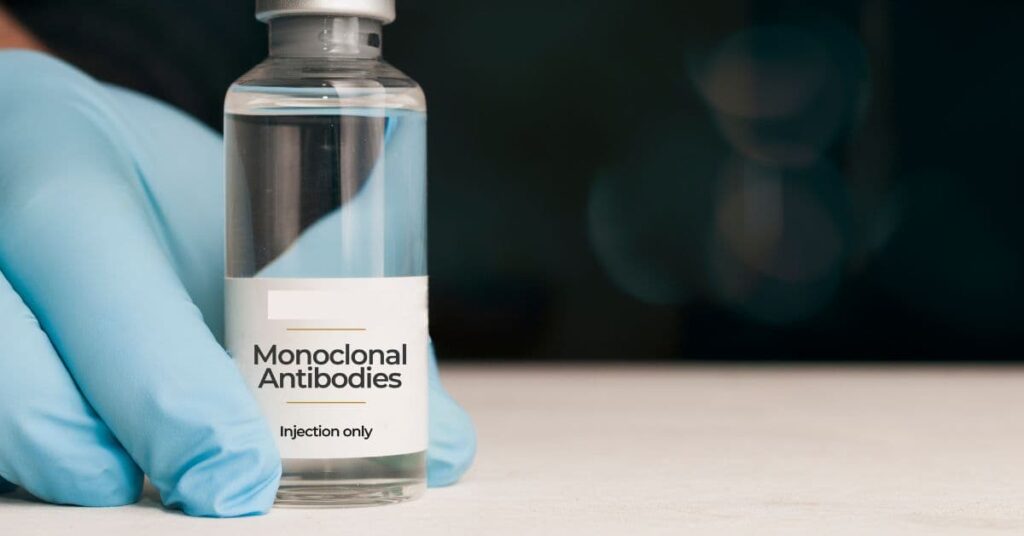Monoclonal antibodies (mAbs) represent a breakthrough in medicine, offering targeted therapies for both autoimmune and infectious diseases. Unlike traditional treatments, monoclonal antibodies are lab-engineered to precisely target specific molecules, allowing them to treat conditions with greater accuracy and fewer side effects. This article delves into how monoclonal antibodies work, their applications in autoimmune and infectious diseases, and their potential for transforming future therapies.
What Are Monoclonal Antibodies?

Monoclonal antibodies are lab-produced molecules that mimic the immune system’s ability to fight off harmful pathogens. They are designed to bind to specific antigens, or markers, on the surface of cells or pathogens, enabling them to target disease processes with precision. Once bound, mAbs can neutralize the harmful agents, block cell signaling, or tag diseased cells for destruction by other immune cells.
How Monoclonal Antibodies Work
Monoclonal antibodies function in various ways to combat disease:
- Neutralization: By binding to pathogens, mAbs can block their ability to infect cells, effectively neutralizing the infection.
- Immune System Activation: mAbs can tag pathogens or diseased cells, signaling the immune system to destroy these targets.
- Inhibiting Inflammatory Processes: For autoimmune diseases, mAbs can block specific immune responses, reducing inflammation and preventing further damage to healthy tissues.
This targeted approach allows monoclonal antibodies to treat diseases more effectively than conventional medications, which may act broadly within the body.
Applications in Autoimmune Diseases

Monoclonal antibodies have revolutionized the treatment of autoimmune diseases, where the immune system mistakenly attacks the body’s tissues:
- Rheumatoid Arthritis: mAbs like adalimumab and infliximab target tumor necrosis factor-alpha (TNF-α), a protein that promotes inflammation in joints, helping to reduce symptoms and slow disease progression.
- Multiple Sclerosis: mAbs like ocrelizumab target B-cells to prevent immune cells from attacking nerve fibers, offering symptom relief and slowing disease progression.
- Lupus: Newer mAbs, such as belimumab, target specific immune pathways to reduce lupus symptoms and improve quality of life.
By blocking specific proteins or cells responsible for inflammation, monoclonal antibodies help control immune responses without compromising the entire immune system.
Applications in Infectious Diseases
Monoclonal antibodies are also playing an important role in the fight against infectious diseases:
- COVID-19: During the COVID-19 pandemic, mAbs such as casirivimab and imdevimab were developed to neutralize the virus and reduce severe symptoms in high-risk patients.
- HIV: Research is exploring mAbs that target specific regions of the HIV virus, which could offer long-term viral suppression and potential prevention strategies.
- Respiratory Syncytial Virus (RSV): Palivizumab is an mAb approved for preventing RSV infection in high-risk infants, helping to reduce hospitalizations and severe infections.
Unlike vaccines, which stimulate the immune system to produce antibodies over time, monoclonal antibodies provide immediate, short-term protection or therapeutic effects, making them useful in urgent situations or for patients with weakened immune systems.
Advantages and Challenges of Monoclonal Antibody Therapies
Advantages:
- Precision Targeting: mAbs can target specific molecules, reducing side effects compared to non-specific drugs.
- Fast Action: They work quickly, making them effective in acute situations like infections or severe autoimmune flare-ups.
- Combination Potential: mAbs can be combined with other treatments for enhanced effectiveness.
Challenges:
- Cost: Monoclonal antibody therapies are expensive due to the complex process of developing and producing them.
- Risk of Resistance: Some diseases, particularly viruses, can evolve and develop resistance to mAbs over time.
- Administration: Most mAbs are administered via injection or infusion, which may require clinical settings and repeat treatments.
The Future of Monoclonal Antibodies
Research into monoclonal antibodies is ongoing, with potential applications expanding across various medical fields. Advances in biotechnology are making it possible to develop mAbs that last longer, work more effectively, and may even be administered orally in the future. Additionally, as researchers discover more about the immune system’s pathways, mAbs are likely to become even more tailored, offering highly personalized and effective treatments.
Monoclonal antibodies are transforming treatment for autoimmune and infectious diseases, providing precision-targeted therapies with fewer side effects and faster results. Their applications in conditions like rheumatoid arthritis, multiple sclerosis, COVID-19, and HIV showcase the versatility and effectiveness of this approach. While challenges remain, the future of monoclonal antibody therapy looks promising, with the potential for new treatments that improve patient outcomes and redefine medical care.
